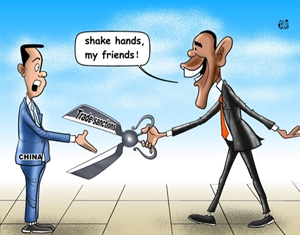Didnt really get the comic but close enough
Here we have an article about the argument (mostly) against State owned Capitalism; e.g. companies in China, Petrobras etc. Let's get straight to the point; it argues that State owned Companies are ineffecient, breeds corruption and cronnyism, with strong manipulation and control by the government. Not to be a socialist / communist myself, but I think in some critical areas / sectors of a country (e.g. Energy & Utilities, Food Supply) it could be rather useful for a country to manage it from afar by owning a majority of the shares. I blatantly disagree if you were to say that all entities should be privatized as if you did it; you'll end up being like America.
The questions is why? and how?
You want to talk about corruption and cronnyism? What about all those companies and corporations who sponsor Presidential Campaign ads, only in turn, make the President of one of the world's economic powerhouse their puppet - much like corruption? sounds like cronnyism to me too. Companies being ineffecient? Ineffecient in terms of making money; but not necessarily ineffecient in terms of serving the people socially. Manipulation and control by the government is essential since to me, I find that no coporation should be more powerful than the government; else people would suffer; simple cases, America, United Kingdom, South Korea. Fine they have a larger GDP Per Capita - but look at how the underprivellaged are treated (those with no money) and look at how they spend?
But of course, this is a contentious issue.
Still open to discussion.


